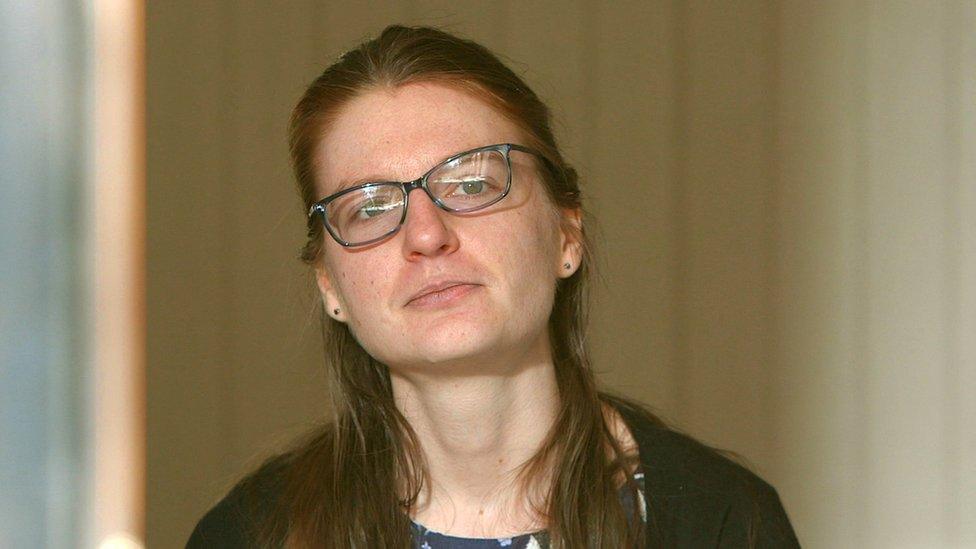Covid in Scotland: 'My brother stopped eating after home care cuts'
- Published
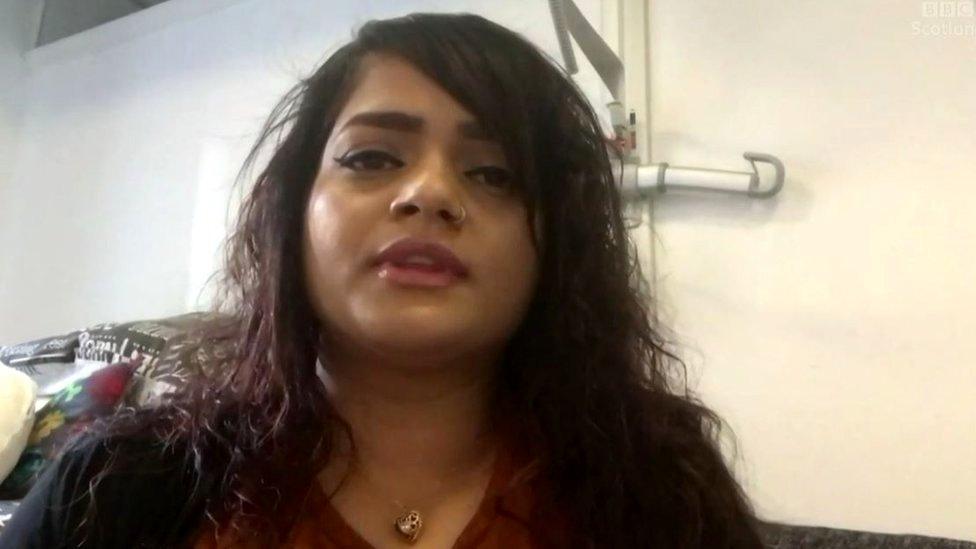
Asia Akram has looked after her brother Rez for years - but had to deliver round-the-clock care during lockdown
Asia Akram says she has not slept properly in six months.
The Dundee mother has looked after her brother Rez for years, but found herself delivering round-the-clock care when his home care support was cut back during lockdown.
Rez, who has cerebral palsy, previously received a day care service - which enabled him to go out four days a week - and overnight respite seven times a month.
For Asia these council services were "like a relief" and allowed her to spend time with her five children.
But because of "necessary" cuts to cope with pandemic staffing, this support disappeared "with no warning", according to Asia.
It meant that while 33-year-old Rez still received help with personal care, he was unable to go outdoors.
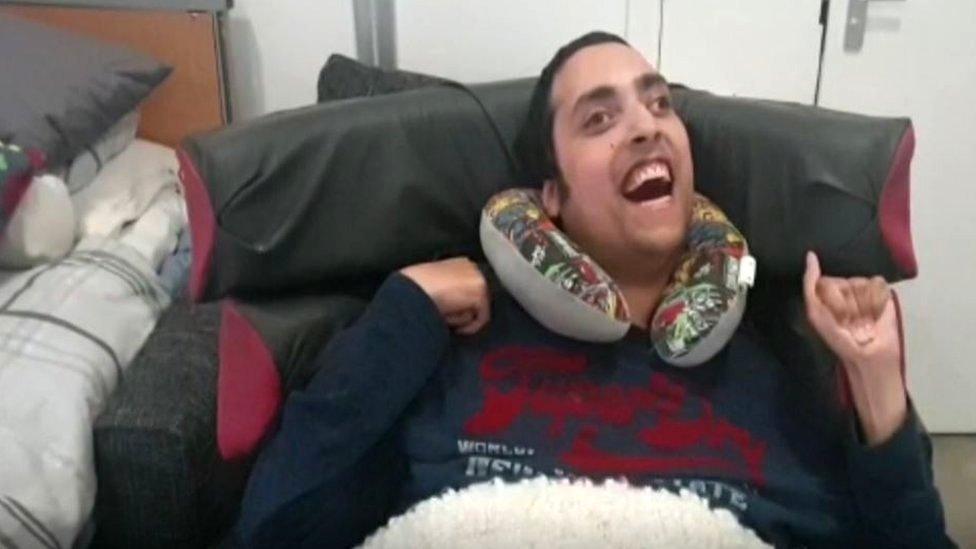
Home care cuts has had an impact on Rez's mental wellbeing
The siblings are among a "considerable" number of people who have had home care either reduced or completely scrapped during the lockdown, according to a report.
The Scottish Human Rights Commission has published research showing people were left without essential care such as help to wash, use the toilet and go to bed.
Evidence suggests some people were "forced to sleep in wheelchairs".
The commission claims that the removal of care plans may have been non-compliant with human rights in some cases.
Local government body Cosla said a review was taking place.
'I'm so, so tired'
Asia and Rez have since had some of their old services restored - but the six-month gap in support has impacted on both their physical and mental wellbeing.
"I've found it very difficult at times because I'm so, so tired," Asia told BBC Scotland's The Nine.
"My days start at 06:30 and I don't finish until sometimes 01:00 - 03:00 - and that's every single day.
"It got to the point where Rez stopped communicating with me. He wasn't interacting with me, he wasn't eating and drinking properly.
"What happens if we get unwell and can no longer take care of our family members - where are they going to go?"
The Scottish Human Rights Commission report, published on Tuesday, includes claims from a user-led organisation which described people in "dire situations" who were "forced to sleep in wheelchairs".
'Physical and mental breakdown'
It also said family members had been "forced into caring roles" and in some cases, had to give up their jobs as a result.
Another disabled people's organisation claimed one individual had a "physical and mental breakdown" after being left in their wheelchair "not properly dressed" for "hours at a time".
The report said these impacts "have the potential to engage rights to life, physical and psychological integrity as well as to dignity and autonomy, under Articles 2, 3 and 8 of the European Convention on Human Rights."
It also stated: "In many cases, the withdrawals and reductions seen in the early months of the pandemic happened rapidly, without either adequate communication or assessment of the proportionality of such decisions."
The commission has called on the Scottish government and Cosla to commit to recommencing care to pre-pandemic levels "as a minimum".
It has set out 23 further recommendations in the report, including data collection to monitor the removal of care packages.
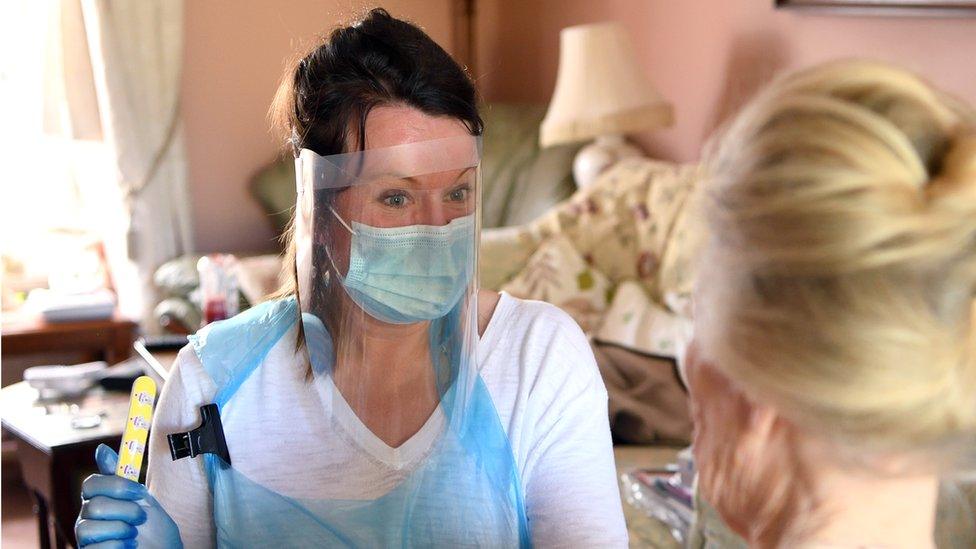
The removal of some home care plans may have been non-compliant with human rights, according to the Scottish Human Rights Commission
Commission chairwoman Judith Robertson said: "Looking ahead, human rights can and should be used by public authorities as a tool to strengthen how decisions are made about social care.
"This would ensure stronger protections and respect for people's rights as we all continue to navigate our way through Covid-19.
"Ultimately, the commission wants to see a social care system, based on human rights, capable of delivering the outcomes which are enshrined in the UN Convention on the Rights of Persons with Disabilities."
Changes were 'necessary'
Councillor Stuart Currie, Cosla's health and social care spokesman, said that local governments attempted to ensure social care support continued when the pandemic hit.
However, he said that support could not be delivered in the same way for some people - and others no longer wanted support.
"It is critical that where this has happened it is reviewed and this work is under way in health and social care partnerships," he said.
"Cosla agree that human rights should be enshrined in social care and this must be central to any reform or review of social care, this report sets out helpful recommendations to support this approach."
A Scottish government spokeswoman said short-term changes to support were "necessary" because of the reduction in workforce during the pandemic.
However, she added that the government had established an independent review of adult social care with a human-rights based approach to consider "what changes are required".


- Published24 August 2020
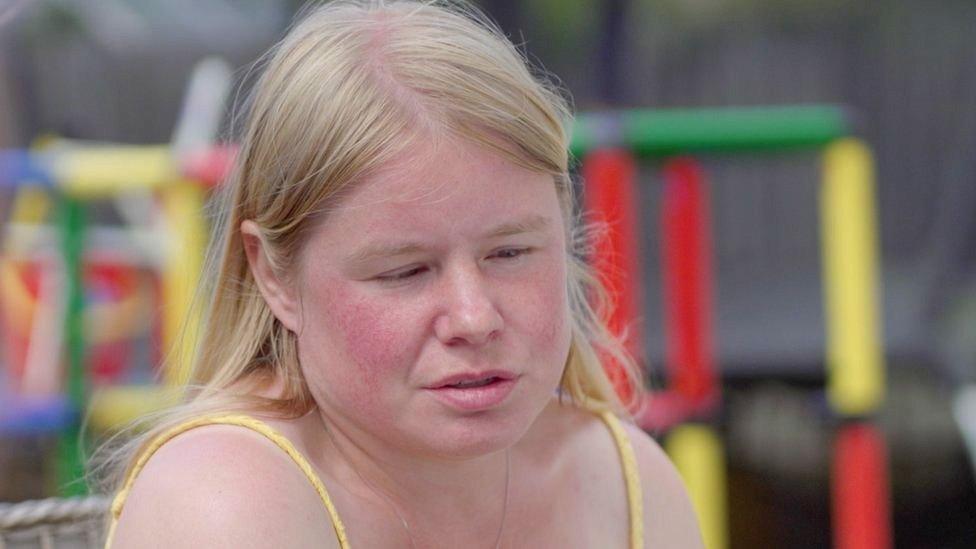
- Published27 April 2020
